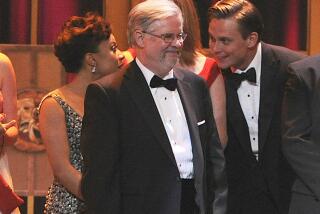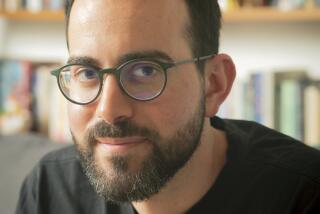Christopher Fry, 97, Playwright, Script Doctor for ‘Ben-Hur’
- Share via
Christopher Fry, the British playwright best known for his durable comedy “The Lady’s Not for Burning” and who helped write the script for Hollywood’s 1959 epic motion picture “Ben-Hur,” has died. He was 97.
Fry died June 30 in Chichester, England, of unspecified causes, his family announced.
The wry wordsmith flourished in the mid-20th century when he was called Britain’s greatest playwright and compared to Shakespeare. Legendary actor Laurence Olivier referred to him as “a dialogue-sorcerer,” and British critic Harold Hobson described him as “a master jeweler of words.”
Expert at blank-verse drama, Fry produced optimistic comedies in T.S. Eliot’s religious drama movement after World War II -- offering humorous comfort to his war-weary countrymen with such lines as, “What after all is a halo? It’s only one more thing to keep clean.”
In 1950, Fry had three plays, including the adaptation “Ring Round the Moon,” running simultaneously in London, and made an impressive entry on Broadway with Richard Burton in “The Lady’s Not for Burning.”
Major actors of the day lined up for his scripts -- John Gielgud, Olivier, Edith Evans, Paul Scofield and Denholm Elliot as well as the young Burton.
“Fry was a lyric poet who blazed into the gray postwar West End like a one-man firework display,” recalled the International Herald Tribune in 2002, when “The Lady’s Not for Burning” was again being staged in London.
Fry’s 1948 signature play, about a woman accused of witchcraft and threatened with death who meets a jaded soldier begging to be hanged, was set in 1400. Gielgud, Pamela Brown, Burton and Claire Bloom played major roles in the original cast. The play was presented again in 2001 by Britain’s National Theatre as one of the 100 best plays of the 20th century.
Fry’s script was so entrenched in theatrical literature that former Prime Minister Margaret Thatcher’s speechwriters persuaded her to twist the line, in response to demands for budget cuts, asserting, “The lady’s not for turning.”
The play has been staged repeatedly over the years, locally as well as internationally, including a 2001 outing by the Malibu Stage Company.
Fry’s satirical comedy “Ring Round the Moon,” an adaptation of Jean Anouilh’s “L’Invitation au Chateau,” also remained popular with small theater companies, including the Lamb’s Players Theater, which staged it in National City, Calif., in 1985.
Pasadena Playhouse presented several of Fry’s works, particularly in the 1950s, during his heyday. Among them was “A Sleep of Prisoners” in 1955.
A Times reviewer said Fry’s spiritual tale of imprisoned soldiers’ dreams demonstrated “a quality not unlike an old medieval morality play.”
Among Fry’s other plays were “Venus Observed,” “The Dark Is Light Enough,” “A Yard of Sun” and the poorly received “Curmantle.”
Although he had never written a screenplay, the highly popular playwright was tapped in 1958 as a script doctor along with Gore Vidal for “Ben-Hur.” Dispatched to Rome, where director William Wyler was shooting the tale based on Civil War Gen. Lew Wallace’s biblical novel, Fry acquitted himself so well he essentially rewrote the script and earned contracts for two more features, “Barabbas” in 1961 and John Huston’s unsuccessful “The Bible” in 1966.
“I only write when I’m pushed,” he told London’s Guardian newspaper in 1997, “so I liked working for the cinema.”
Almost as quickly as Fry blazed onto the stage, he faded off. John Osborne, author of “Look Back in Anger,” and other edgier playwrights dubbed the “angry young men” grabbed the limelight.
Fry surfaced occasionally, writing a television series about the Brontes and translating plays, including Edmond Rostand’s verse drama “Cyrano de Bergerac” in the 1970s. He wrote a short new play in 2001 called “A Ringing of Bells.”
“I’ve always found writing difficult,” he told the London Daily Telegraph in 2001, explaining why it became easier to enjoy his home and garden than to churn out scripts. “I meekly do what I’m told, and I’m very easily stopped in my tracks. I’ve not really been master of my own career.”
Writer’s block was so ever-present that Olivier back in 1950, as Fry often related, became nervous that Fry would not complete “Venus Observed” in time for the actor to present it in his debut as manager of St. James’ Theatre. He sent Fry a parcel containing a typewriter ribbon, an eraser and a brush to clean the keys along with a note stating: “Let me know if there’s anything else you need, won’t you. I’m not making you nervous, am I? I do hope I’m not making you nervous.”
In 1978, Fry published a history of his family from 1849 to the 1920s, “Can You Find Me?”
But a Times reviewer wrote of the book, “The answer is no. It remains an interesting excursion into the past of a single family, a century of portraits, but those seeking enlightenment about Fry will have to wait.”
Born Christopher Fry Harris in Bristol, England, on Dec. 18, 1907, he took his maternal grandmother’s name as his surname, mistakenly thinking she was from the Quaker family of the Victorian prison reformer Elizabeth Fry. He became a lifelong pacifist and served in the noncombat Pioneer Corps, cleaning out sewers at the docks during World War II.
Fry’s father died when he was a toddler, and he grew up in Bedford, where his mother took in boarders to pay his way through Bedford Modern School. He taught until 1930, when he devoted himself to the theater -- acting a little, directing more and writing a lot.
In 1932, he helped found the Tunbridge Wells Repertory Players, and in the late 1930s wrote two church-commissioned plays, “The Boy With a Cart” and “The Tower.” He became a director for the Oxford Playhouse in 1940.
After the war, he wrote “A Phoenix Too Frequent,” produced at London’s Mercury Theatre in 1946. That earned him a job as staff dramatist at the Arts Theatre. Next came “The Lady’s Not for Burning” and, very quickly, fame.
Fry’s wife, Phyllis Hart, preceded him in death in 1987. He is survived by their son, Tam.
More to Read
The biggest entertainment stories
Get our big stories about Hollywood, film, television, music, arts, culture and more right in your inbox as soon as they publish.
You may occasionally receive promotional content from the Los Angeles Times.










